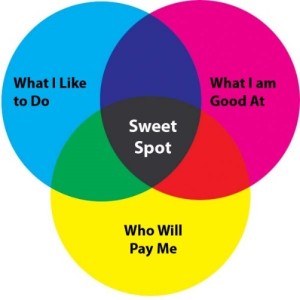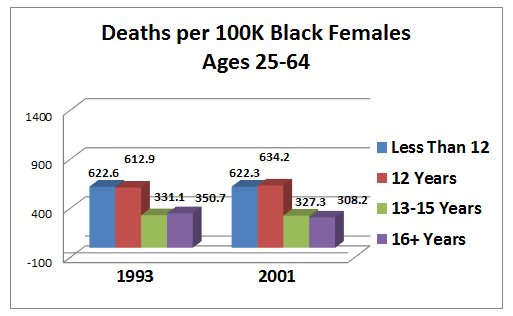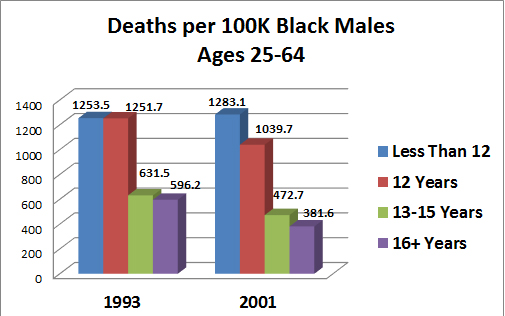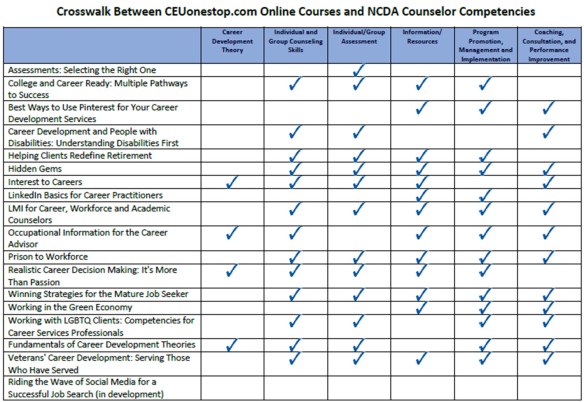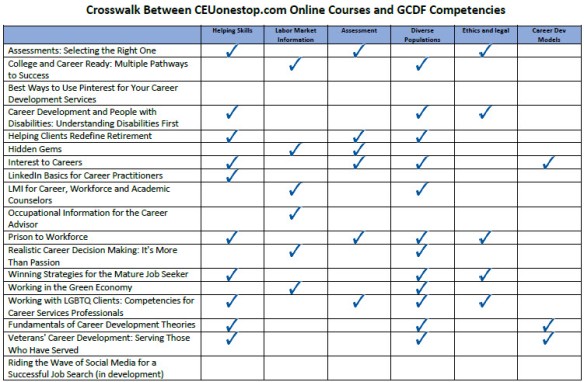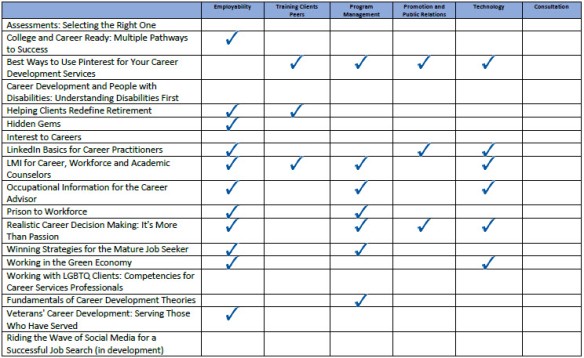 Career Planning Academy: Continuing Education Opportunities for Career Professionals (Assessment)
Career Planning Academy: Continuing Education Opportunities for Career Professionals (Assessment)
(Original published in the January-February Issue of the Career Development Network Newsletter)
by Janet Wall
Career Planning Academy is an approved continuing education provider. Completing any of our online, self-paced courses, certification, live webinars, or recorded webinars earns you clock hours for such certifications as the NCC, LPC, GCDF, BCC, CWDP, EVGP and CRC and the NCDA credentials. Typically these certifications require about 50 -100 clock hours of continuing education every five years. This column is devoted to professional development related to Assessment in Career Development.
Deciding on a career often depends on three major elements – what we like or want to do (interests), what we are good at (abilities and skills), and who will pay you to do what you like and can do (labor market information and jobs). When all three areas are working in harmony, we experience the sweet spot in our career progression.
Typically, assessments play a critical role in the first two areas – determining what we like to do and what we are good at. Because this is true, it is imperative that career and workforce development advisors, counselors, and coaches understand what factors are important in using good assessment with their students and clients, and how they can be sure the assessments they use are of appropriate quality.
Here is a short list of factors career development professionals can use as they go about selecting and using assessment in their work.
- Purpose. Why are you using assessment to begin with? What is it you want to know about clients to help them in their career decision making? Until you determine the purpose for which you are using assessment, you should not move forward. Just because your supervisor said you should use an assessment or just because your colleagues are doing so, is no reason to use one or the same one yourself. Your focus should be on what clients need to know about themselves, and how that that information relates to careers. Identify the purpose first and foremost.
- Quality. Presuming you have identified why you are using an assessment, the next step is finding the best one/s for your purpose. Best is typically related to two major technical characteristics – reliability and validity. Reliability relates to how consistently the assessment measures what it is purports to measure. High reliability is important because if an assessment is not measuring consistently, then we have no idea if the result is accurate.
Validity is a word career development professionals bandy about frequently in assessment discussions, but often the real importance of that term is not fully understood. So often when someone asks for a recommendation for a valid assessment, it conveys that the person is not clear on what validity means.
The assessment community has created many very high quality assessments. Naming just a few are the SAT, ACT, ASVAB, SDS, SII and others. These assessments have research studies that show how the results of those assessments can and should be interpreted and used. Although these assessments are highly researched and supported by hundreds of studies, they are not valid for all situations and purposes. Thus, validity is narrowly related to how the results can and should be used; it is not an inherent characteristic of the assessment. Thus, there is no such thing as a valid assessment. Validity deals with the assessment results and the evidence that shows how you can use the results for certain interpretations and uses, not for just any purpose.
If there is little or weak reliability or validity evidence available on the assessment you are considering, don’t use it. Using it would be unprofessional and unethical, and it has the potential of harming your client. Professional ethics standards support this claim.
- Interpretation. Working with a student or client on interpreting an assessment is both an art and a science. The art part comes with appreciating your client’s ability to understand the interpretation and using language they comprehend and can relate to. You need to provide sufficient information so that clients understand and can act on the results, but not so much as to overwhelm them.
The science part relates back to the validity concept in that your interpretation of the results to and with the client should not deviate beyond what the validity evidence supports. Limit your interpretation only to what the authors or publishers have confirmed through research studies.
Just as one example of a misinterpretation: sometimes career development professionals might steer clients that have an introverted preference to careers and jobs that are quiet and don’t related much to people. There is no evidence that shows introverts cannot be successful in high relatability jobs. To shut people out of certain careers based on little evidence is at best misplaced, and at worst immoral.
One last point: as career professionals, we must be competent in the assessment and not go beyond our training. Some assessments require specific training and others do not. Even if training on the assessment is not mandatory, it is incumbent upon us to know the assessment thoroughly and read all the available information on it, including the technical manuals.
- Utility. This concept relates to budget, utility, ease of administration, and storage of results. These real world conditions have to be thought out well before we start using assessments. There are some assessments that cost dozens and hundreds of dollars per person. Some of us do not work in institutions that can afford that. We need to look for comparable quality assessments that fit the budget we have. Free assessments are only an option if they meet our stated purpose and have substantial technical quality.
Utility deals with the mode of administration. We may not be able to use an internet delivered assessment and only paper and pencil will do. We may not be able to store hundreds of paper and pencil assessments, and only computer storage will do. We or the client may not have several hours to take an assessment. There are other practical aspects to consider.
If you are interested in upskilling on the use of assessment in career and workforce development, Career Planning Academy has a number of relevant courses and webinars that relate. They are:
Selecting the Right Assessment (4 CEU clock hours)
Assessment Issues for America’s Job Center Staff (4-5 CEU clock hours)
Visit the website https://careerplanningacademy.com for more continuing education opportunities. Sign up for the VIP Mailing List offering periodic discounts: www.eepurl.com/EUz8f
________________
 Janet Wall, EdD is Founder of Career Planning Academy, author of McGraw-Hill’s ASVAB books, co-author of the Ability Explorer assessment, and former manager of the ASVAB Career Exploration Program. She is an NCDA Fellow and FCD Instructor.
Janet Wall, EdD is Founder of Career Planning Academy, author of McGraw-Hill’s ASVAB books, co-author of the Ability Explorer assessment, and former manager of the ASVAB Career Exploration Program. She is an NCDA Fellow and FCD Instructor.
careerfacilitator@janetwall.net https://careerplanningacademy.com

